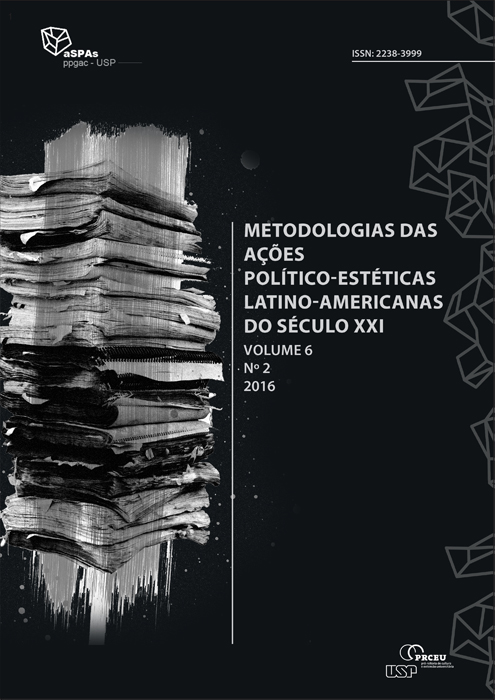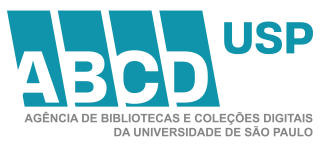Coevolutionary parameters and politic contexts to analise and develop processes of creation
DOI:
https://doi.org/10.11606/issn.2238-3999.v6i2p46-56Keywords:
coevolution, dance, real time, ways of organization, authoritarianismAbstract
Basing creation or organization of methodologies on the artist’s experiences and own way of understanding the world seems to be an active political path. Still, this text assumes that the ways of organizing an artistic creation can be structured in Real Time from what emerges from the dynamics proposed during a process, not necessarily being given a priori. Through the author’s experience and systematization of her own creative processes in dance, this article aims to address the idea of methodology as a coevolutionary aspect to the creation process, being necessary to regard the political context in which the dramaturgical and aesthetic choices are developed, as well as the mechanisms that insist on restricting spaces of participation, individual freedom, and autonomy.Downloads
References
AVRITZER, L. Cultura política, atores sociais e democratização. Revista Brasileira de Ciências Sociais, São Paulo, v. 10, n. 28, p. 109-122, jun. 1995.
______. Teoria democrática e deliberação pública. Lua Nova, São Paulo, n. 50, p. 25-46, 2000.
BUNGE, M. A. Emergence and convergence: qualitative novelty and the unity of knowledge. Toronto: University of Toronto, 2003.
______. Dicionário de filosofia. São Paulo: Perspectiva, 2006.
______. Political philosophy: fact, fiction and vision. New Jersey: Transaction Publishers, 2009.
CHAUÍ, M. Cultura política e política cultural. Estudos Avançados, São Paulo, v. 9, n. 23, p. 71-84, 1995.
DAWKINS, R. Desvendando o arco-íris. São Paulo: Companhia das Letras, 2000.
______. O gene egoísta. Belo Horizonte: Itatiaia, 2001.
______. The extended phenotype. New York: Oxford University Press, 1999.
MARTIN-BARBERO, J. Ofício de cartógrafo: travessias latino-americanas da comunicação na cultura. São Paulo: Loyola, 2004.
MOISÉS, J. Á. Os brasileiros e a democracia. São Paulo: Ática, 1995.
O’DONNELL, G. Horizontal accountability in new democracies. Journal of Democracy, Washington, DC, v. 9, n. 3, p. 112-126, 1998.
PEREIRA, M. L. D. As políticas públicas locais e os processos de “hibridação” no Brasil e na América Latina. In: DAGNINO, E.; TATAGIBA, L. (org.). Democracia, sociedade civil e participação. Chapecó: Argos, 2007. p. 331-350.
PORT, R.; GEDER, T. van (orgs.). Mind as motion. Massachusets: The MIT Press, 1995.
SEN, A. Desenvolvimento como liberdade. São Paulo: Companhia das Letras, 2009.
THELEN, E. Time-scale dynamics and the development of an embodied cognition. In: PORT, R.; GEDER, T. (ed.). Mind as motion. Massachusetts: The MIT Press, 1995. p. 69-100.
______. Grounded in the world: developmental origins of the embodied mind. In: TSCHACHER, W.; DAUWALDER, J.-P. The dynamical systems approach to cognition. Singapore: World Scientific Publishing, 2003. p. 17-44.
Downloads
Published
Issue
Section
License
Copyright (c) 2017 Revista Aspas

This work is licensed under a Creative Commons Attribution 4.0 International License.
Whenever publishing material referring to the article published in the aSPAs Journal, the authors commits to mentioning such publication as follows:
“This article was originally published by aSPAs Journal volume (insert the volume), number (insert the number) in the year (insert the year) and can be accessed in: http://revistas.usp.br/aspas"







